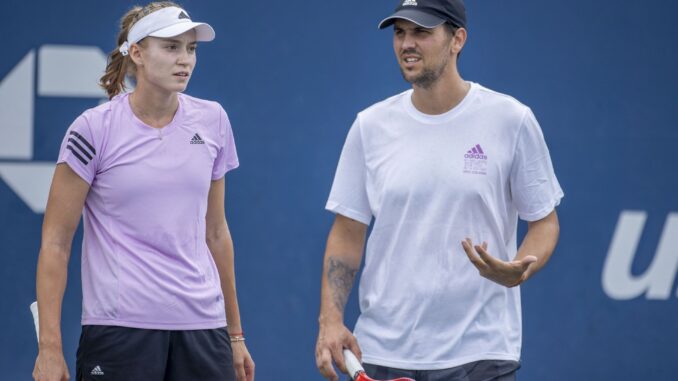
A storm has erupted across the tennis world this weekend, ignited by the WTA’s decision to lift the suspension of Stefano Vukov, the controversial coach of Elena Rybakina. The ruling permits Vukov to access player areas and practice courts again—a move that has sparked fierce backlash online, with many fans branding it “incredibly irresponsible” and a troubling “dangerous precedent.”
Tensions skyrocketed when the governing body quietly reversed course on Friday afternoon, granting Vukov tournament credentials after he reportedly appealed the provisional suspension. Rybakina herself has consistently stood in defense of the coach, stating flatly that “he never mistreated me,” and that her affiliation with him stems from years of shared success and mutual understanding.
The backdrop to this unfolding drama is a tangled web of allegations. Earlier this year, the WTA suspended Vukov pending an investigation into potential breaches of its Code of Conduct. While specifics have remained under wraps, the probe centered on concerns that rose to the level of a safeguarding violation. Vukov has vigorously denied any wrongdoing, insisting, “I have never abused anyone,” while Rybakina’s public remarks echoed the same unwavering loyalty.
Fans, however, are not so forgiving. Comments have ranged from despairing to accusatory. One user proclaimed, “Once again, the Tour fails in its duty of care,” while another echoed the sentiment of many when they declared, “I hope things go in the right direction for her, but this time all the eyes will be on Vukov.” The sense that the WTA is prioritizing optics over athlete welfare has angered many voices in the community, with one calling it “careless.”
A cornerstone of the controversy lies in the history between Rybakina and Vukov. Their partnership dates back to 2019, when he joined her at a time she was ranked near the bottom of the top 200. Together, they surged to the top: five years later, Vukov had coached her to eight WTA titles—including Wimbledon—and a career-best ranking near world No. 3. Yet, their journey ended suddenly last August, just before the U.S. Open. Rybakina then brought in Goran Ivanisevic as her new coach for the 2025 season—but before long, she reversed course and announced Vukov’s return, even as the investigation was unfolding.
This curious move fueled speculation that the earlier split may have been forced by the circumstances of the investigation. Observers wondered whether Rybakina briefed Ivanisevic—or anyone—on her intention to bring Vukov back. Unsurprisingly, fans lit up social media, with one commenting: “It’s absolutely insane that Elena did not tell Ivanisevic before rehiring her old coach… it’s about trust.”
Yet, through it all, Rybakina remained resolute. At a post-match appearance earlier this year, she reflected, “I’ve always responded well to direct coaching… and I’ve never felt disrespected by him,” affirming the consistency of their dynamic. Still, outside the spotlight, whispers grew louder: rumors of a “toxic relationship,” emotional strain, and even allegations of mental and physical abuse emerged—and while Rybakina steadfastly rejected them, the mere existence of such claims cast a long, unwelcome shadow.
Now, with Vukov’s credentials restored, the spotlight has shifted to how this maples into upcoming tournaments. Will he be monitored closely? Will his presence become a distraction—or worse, a liability? Fans have made it clear: they’ll be watching his every move.
Beyond Rybakina’s personal saga, this controversy has reignited a broader debate: where is the line between tough, high-performance coaching and unacceptable conduct? And what role should governing bodies play when that line feels blurred? The WTA’s decision to lift Vukov’s suspension, at least for now, is being seen by many as a pivotal moment—one that will either reinforce accountability or open the floodgates to further controversy
Leave a Reply